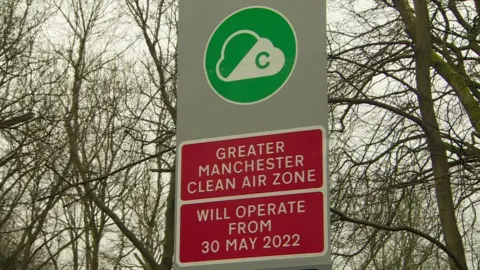Greater Manchester Clean Air Zone: More than £60m spent on scheme
 BBC
BBCMore than £60m has been spent on Greater Manchester's Clean Air Zone (CAZ) despite the controversial scheme still never having gone ahead.
The plan to charge the most polluting vehicles on the city's roads was paused following a public backlash earlier this year.
Mayor Andy Burnham said the scheme became "unworkable" post-pandemic.
But it means the city is now facing a shortfall because it is tied into contracts with no revenue from charges.
The Local Democracy Reporting Service said £62m has so far been spent on the CAZ up to the end of September.
The cash covers staffing and operational costs associated with things such as the deployment of Automatic Number Plate Recognition (ANPR) cameras, which are used to inform the scheme.
CAZs were designed to encourage people to drive less-polluting vehicles, including those powered by electric, and more modern petrol and diesels.
'Complex challenge'
The government has been calling on regional authorities to introduce CAZs since the UK's highest court, the Supreme Court, ordered ministers in 2015 to take immediate action to cut air pollution.
The CAZ in Greater Manchester had originally been due to start on 30 May, but it was postponed in February with the government saying it would allow for consultation and a revised plan.
Greater Manchester must agree a new scheme with the government which achieves air quality compliance within NO2 limits no later than 2026.
A Clean Air GM spokesman said: "Protecting people's health is a priority and in common with many other areas across the country, Greater Manchester's 10 local authorities have been working on the basis of a process determined by government to develop a plan to clean up our air.
"All costs to date have been covered by, and agreed with, [the] government, with no cost requirement or contribution from local authorities in Greater Manchester.
"This is a significant and complex challenge and the economic impact of the pandemic on the cost of clean vehicles meant the plan originally agreed by government might not have worked but could have caused financial hardship for local people."

Why not follow BBC North West on Facebook, Twitter and Instagram? You can also send story ideas to [email protected]
